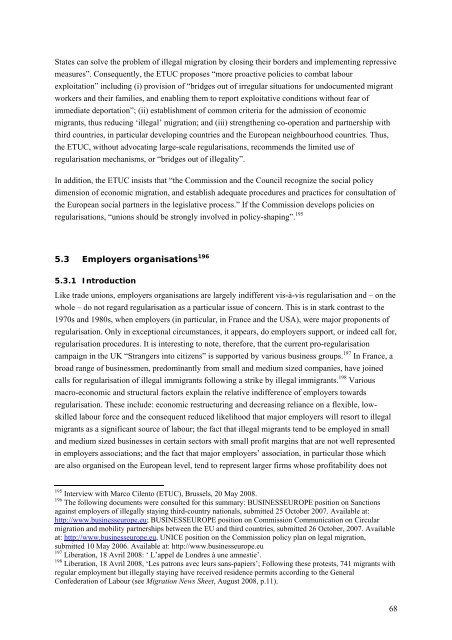REGINE Regularisations in Europe Final Report - European ...
REGINE Regularisations in Europe Final Report - European ...
REGINE Regularisations in Europe Final Report - European ...
Create successful ePaper yourself
Turn your PDF publications into a flip-book with our unique Google optimized e-Paper software.
States can solve the problem of illegal migration by clos<strong>in</strong>g their borders and implement<strong>in</strong>g repressive<br />
measures”. Consequently, the ETUC proposes “more proactive policies to combat labour<br />
exploitation” <strong>in</strong>clud<strong>in</strong>g (i) provision of “bridges out of irregular situations for undocumented migrant<br />
workers and their families, and enabl<strong>in</strong>g them to report exploitative conditions without fear of<br />
immediate deportation”; (ii) establishment of common criteria for the admission of economic<br />
migrants, thus reduc<strong>in</strong>g ‘illegal’ migration; and (iii) strengthen<strong>in</strong>g co-operation and partnership with<br />
third countries, <strong>in</strong> particular develop<strong>in</strong>g countries and the <strong>Europe</strong>an neighbourhood countries. Thus,<br />
the ETUC, without advocat<strong>in</strong>g large-scale regularisations, recommends the limited use of<br />
regularisation mechanisms, or “bridges out of illegality”.<br />
In addition, the ETUC <strong>in</strong>sists that “the Commission and the Council recognize the social policy<br />
dimension of economic migration, and establish adequate procedures and practices for consultation of<br />
the <strong>Europe</strong>an social partners <strong>in</strong> the legislative process.” If the Commission develops policies on<br />
regularisations, “unions should be strongly <strong>in</strong>volved <strong>in</strong> policy-shap<strong>in</strong>g”. 195<br />
5.3 Employers organisations 196<br />
5.3.1 Introduction<br />
Like trade unions, employers organisations are largely <strong>in</strong>different vis-à-vis regularisation and – on the<br />
whole – do not regard regularisation as a particular issue of concern. This is <strong>in</strong> stark contrast to the<br />
1970s and 1980s, when employers (<strong>in</strong> particular, <strong>in</strong> France and the USA), were major proponents of<br />
regularisation. Only <strong>in</strong> exceptional circumstances, it appears, do employers support, or <strong>in</strong>deed call for,<br />
regularisation procedures. It is <strong>in</strong>terest<strong>in</strong>g to note, therefore, that the current pro-regularisation<br />
campaign <strong>in</strong> the UK “Strangers <strong>in</strong>to citizens” is supported by various bus<strong>in</strong>ess groups. 197 In France, a<br />
broad range of bus<strong>in</strong>essmen, predom<strong>in</strong>antly from small and medium sized companies, have jo<strong>in</strong>ed<br />
calls for regularisation of illegal immigrants follow<strong>in</strong>g a strike by illegal immigrants. 198 Various<br />
macro-economic and structural factors expla<strong>in</strong> the relative <strong>in</strong>difference of employers towards<br />
regularisation. These <strong>in</strong>clude: economic restructur<strong>in</strong>g and decreas<strong>in</strong>g reliance on a flexible, lowskilled<br />
labour force and the consequent reduced likelihood that major employers will resort to illegal<br />
migrants as a significant source of labour; the fact that illegal migrants tend to be employed <strong>in</strong> small<br />
and medium sized bus<strong>in</strong>esses <strong>in</strong> certa<strong>in</strong> sectors with small profit marg<strong>in</strong>s that are not well represented<br />
<strong>in</strong> employers associations; and the fact that major employers’ association, <strong>in</strong> particular those which<br />
are also organised on the <strong>Europe</strong>an level, tend to represent larger firms whose profitability does not<br />
195 Interview with Marco Cilento (ETUC), Brussels, 20 May 2008.<br />
196 The follow<strong>in</strong>g documents were consulted for this summary: BUSINESSEUROPE position on Sanctions<br />
aga<strong>in</strong>st employers of illegally stay<strong>in</strong>g third-country nationals, submitted 25 October 2007. Available at:<br />
http://www.bus<strong>in</strong>esseurope.eu; BUSINESSEUROPE position on Commission Communication on Circular<br />
migration and mobility partnerships between the EU and third countries, submitted 26 October, 2007. Available<br />
at: http://www.bus<strong>in</strong>esseurope.eu, UNICE position on the Commission policy plan on legal migration,<br />
submitted 10 May 2006. Available at: http://www.bus<strong>in</strong>esseurope.eu<br />
197 Liberation, 18 Avril 2008: ‘ L’appel de Londres à une amnestie’.<br />
198 Liberation, 18 Avril 2008, ‘Les patrons avec leurs sans-papiers’; Follow<strong>in</strong>g these protests, 741 migrants with<br />
regular employment but illegally stay<strong>in</strong>g have received residence permits accord<strong>in</strong>g to the General<br />
Confederation of Labour (see Migration News Sheet, August 2008, p.11).<br />
68
















